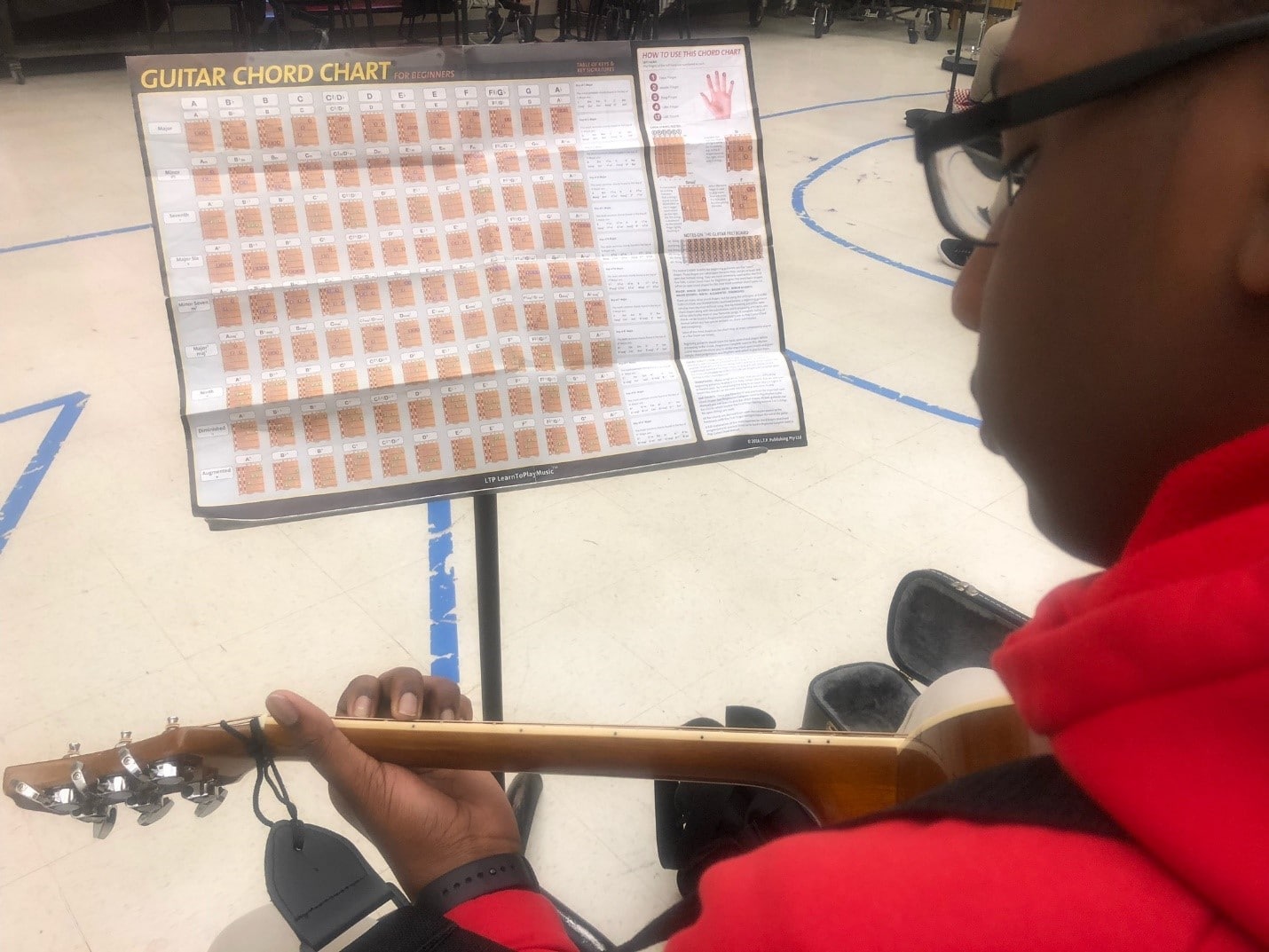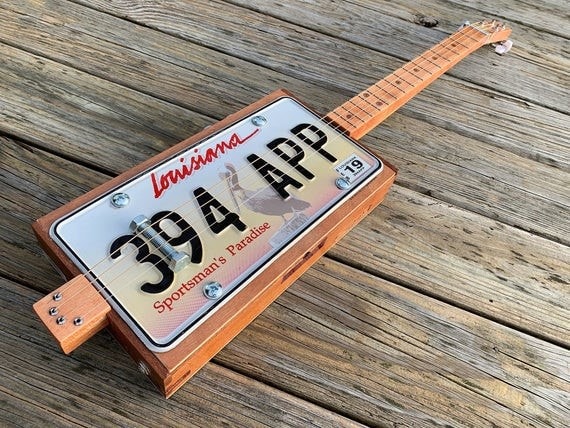/ News Posts / Guitar Class in the Pelican State
Guitar Class in the Pelican State
Number 41: State of Louisiana
By Thomas Amoriello Jr.
NAfME Council for Guitar Education Chair
In this edition of “50 States of Guitar Class,” the NAfME Guitar Council visits Baton Rouge and the guitar program of Mr. Glenn Scheuermann at Woodlawn High School. The school’s mission statement provides a safe and supportive environment that fosters opportunities for all students to achieve academic success, while also ensuring students obtain necessary life skills through partaking in opportunities to grow intellectually, philanthropically, and socially. That being said, the guitar helps fulfill that philosophy very well. The class is open to all students. Students in guitar class learn musical notation, basic tablature, tuning methods, chords, chord progressions, and so much more.
Thank you, Mr. Scheuermann, for sharing your insight with the NAfME membership.
Please tell us about your school and overall music program.
Woodlawn High School is a traditional (non-charter) public high school in the East Baton Rouge Parish (county) Public Schools system. It includes approximately 1,200 students, many of whom are on free or reduced lunch. The school offers a plethora of music opportunities: band, jazz band, choir, orchestra, guitar, piano, talented music, and new this past year the pre-AP Music Theory course.
Please tell us about your own personal musical background growing up and your collegiate experience.
I was born in Memphis, Tennessee, where my father was stationed in the Navy. But New Orleans, Louisiana, is home, and I have been playing one instrument or another since 4th grade! I suppose I took the typical high school band director’s route: played throughout high school, majored in Music Education at Loyola University in New Orleans graduating with Bachelor’s Degree in 1989, and since then have been lucky enough to spend 30 years in the classroom, all high school, in schools large and small, public and private, rural and urban, in Southeast Louisiana.

I received my Masters of Education from Nicholls State University (Thibodaux, Louisiana) in Educational Administration in 1992. For the next school year, I have been promoted to an Instructional Specialist position in Baton Rouge, focusing on music.
How do the guitar family of instruments fit into your teaching?
For most of the time at Woodlawn, there have been two classes in the day for guitar students: Guitar I classes for beginners. There have been a few experienced students who joined the class, but may not have been able to read music. They either played by trial-and-error, by ear, or they mimicked the hand position of chords from tabs, but couldn’t really say what notes made up the chords.
What obstacles as a music teacher did you face when you were first hired at your school? Now?
At first, it was definitely finding where the guitars would come from to play/learn in class, by far! My school system does not provide guitars like other band instruments, pianos, etc. So students would have to provide their own. (They still do.) Furthermore, students were required to have an acoustic, rather than an electric, guitar. This cut down on bringing amps back and forth, and definitely cut down on the volume of sound! (And me constantly saying, “Turn down, turn down!”)
Also in the beginning, if other classes were full that hour, and a student needed something to take, the attitude was, “Hey, let’s put them in Guitar class.” But it’s certainly hard to play in guitar class with no guitar! (Students had no intention of finding/playing a guitar in this scenario.)

Photo courtesy Glenn Scheuermann
Now, I can thankfully say, there are not many obstacles. The course seems popular; so having one of me and 15 to 20 of them is a challenge to provide one-on-one instruction and keep the class as a whole moving forward.
How do the guitar family of instruments fit into your teaching?
The only other related class I teach would be jazz band, which is our top group in the band program. I usually recommend a few of the top guitarists in Guitar I to join jazz band, both on guitar and bass—electric and upright. My schedule did not allow for a Guitar II class or something like it.
What would you like to say to the non-guitarist music educator who is about to or interested in incorporating the guitar into their program?
DO IT DO IT DO IT! I am a “non-guitarist educator,” and at first, guitar class was daunting at least, drudgery (perceived) at most. But I encourage it for three reasons:
a) An outlet for you to teach something different, but not too different—it is music, but it is a non-familiar instrument.
b) It gets you into the mainstream of students at your school. In many cases, band directors teach a small niche of students for four years at a school, never really seeing any other students. Similarly, mainstream students never get to see you otherwise.
c) May provide feeder students for other aspects of your program.
Do you have any success stories you would like to share about students?
Yes. Many students I alluded to earlier who could “play but not read” turned into good readers. We backfilled their knowledge: They could transition from chord to chord effortlessly all day long, but did not know what notes they were playing, did not know chord symbols, musical terminology, etc. Many self-taught themselves through the internet or whatever. But by signing up for a course with a professional music teacher, they became complete students, able to read/play any genre of music. Most appreciated the “backfilling”!
What do you tell your talented students who are planning to pursue music or guitar studies in high school or college after they finish with you?
I tell them to keep playing, and to keep listening to great guitarists who have gone before us. Whether they continue with the school’s jazz band or not, it is such a shame to leave the guitar in the corner of the bedroom, or under the bed, for the rest of its life. Also, they should find a reputable guitar lesson teacher to further their studies—there is always someone better than you!
Do you have any networking or advocacy tools that have worked for you promoting your program that would help other educators?
Not necessarily. I would say just trying to do the best one can do in the classroom with the student one has is good for building the program. There’s an old adage, “You can always fool a fool, but you can’t kid a kid.” The kids know which teachers care about them as learners and as people, and which teachers are just punching a timecard.
What kind of future do you see for guitar in music education in the Louisiana school system?
In Louisiana I think it will probably continue to grow, but not necessarily for the right reason. I had/have guitar class as something to fill my day, and something to fill the student’s day. That’s not the best reason for offering a course. But, since the large-scale band and/or choral programs seem to be on the decline, and guitar is a popular part of everyday culture (and more economical than band instruments), we educators may have to adjust as well. And no matter the reason for the course to be offered, it is a chance to interact and teach the youth of our country, which is always a great reason.
Do you participate in any musical performances or activities outside of your public-school teaching duties?
No, not really. No time. But with the new Instructional Specialist gig, there may be time to take in an extra concert, or play in a local community band.
Any last thoughts to conclude our interview?
I thank the Guitar Council and NAfME for the opportunity to be a part of this interview series. To my fellow non-guitar educators, I say, “Guitar class is not so bad after all; there are some good kids to be taught there too, just like the ones in your band.”
Past “Guitar Class in 50 States” articles:
- Number 50: The Granite State (New Hampshire)
- Number 49: The Green Mountain State (Vermont)
- Number 48: The Mountain State (West Virginia)
- Number 47: The Hoosier State (Indiana)
- Number 46: The Mount Rushmore State (South Dakota)
- Number 45: The Pine Tree State (Maine)
- Number 44: The Badger State (Wisconsin)
- Number 43: The Constitution State (Connecticut)
- Number 42: The Evergreen State (Washington)
- Number 40: The Beaver State (Oregon)
- Number 39: The Equality State (Wyoming)
- Number 38: The Empire State (New York)
- Number 37: The Old Line State (Maryland)
- Number 36: The Centennial State (Colorado)
- Number 35: The Bay State (Massachusetts)
- Number 34: The Sooner State (Oklahoma)
- Number 33: The Prairie State (Illinois)
- Number 32: The Hawkeye State (Iowa)
- Number 31: The Volunteer State (Tennessee)
- Number 30: The Palmetto State (South Carolina)
- Number 29: The Natural State (Arkansas)
- Number 28: The Tar Heel State (North Carolina)
- Number 27: The Magnolia State (Mississippi)
- Number 26: The Peace Garden State (North Dakota)
- Number 25: The Treasure State (Montana)
- Number 24: The First State (Delaware)
- Number 23: The Buckeye State (Ohio)
- Number 22: The Yellowhammer State (Alabama)
- Number 21: The Sunflower State (Kansas)
- Number 20: The Great Lakes State (Michigan)
- Number 19: The Lone Star State (Texas)
- Number 18: The Bluegrass State (Kentucky)
- Number 17: The Golden State (California)
- Number 16: The Show-Me State (Missouri)
- Number 15: The Keystone State (Pennsylvania)
- Number 14: The Last Frontier State (Alaska)
- Number 13: The Beehive State (Utah)
- Number 12: The Peach State (Georgia)
- Number 11: The Cornhusker State (Nebraska)
- Number 10: The Gem State (Idaho)
- Number 9: The Old Dominion (Virginia)
- Number 8: The Aloha State (Hawaii)
- Number 7: The Land of Enchantment (New Mexico)
- Number 6: The Sunshine State (Florida)
- Number 5: The Grand Canyon State (Arizona)
- Number 4: The Ocean State (Rhode Island)
- Number 3: The North Star State (Minnesota)
- Number 2: The Silver State (Nevada)
- Number 1: The Garden State (New Jersey)
About the author:
 Thomas Amoriello Jr. serves as the chair on the NAfME Council for Guitar Education and is also the former Chairperson for the New Jersey Music Education Association. Tom has taught guitar classes for the Flemington Raritan School District in Flemington, New Jersey, since 2005 and was also an adjunct guitar instructor at Cumberland County College, New Jersey, for five years. He has earned a Master of Music Degree in Classical Guitar Performance from Shenandoah Conservatory and a Bachelor of Arts in Music from Rowan University. He is the author of the children’s picture books A Journey to Guitarland with Maestro Armadillo and Ukulele Sam Strums in the Sand, both available from Black Rose Writing. He recently made a heavy metal recording with a stellar roster of musicians including former members of Black Sabbath, Whitesnake, Ozzy Osbourne, Yngwie J. Malmsteen’s Rising Force, and Dio that was released on H42 Records of Hamburg, Germany. The record released on 12-inch vinyl and digital platforms has received favorable reviews in many European rock magazines and appeared on the 2018 Top 15 Metal Albums list by Los Angeles KNAC Radio (Contributor Dr. Metal). Visit thomasamoriello.com for more information.
Thomas Amoriello Jr. serves as the chair on the NAfME Council for Guitar Education and is also the former Chairperson for the New Jersey Music Education Association. Tom has taught guitar classes for the Flemington Raritan School District in Flemington, New Jersey, since 2005 and was also an adjunct guitar instructor at Cumberland County College, New Jersey, for five years. He has earned a Master of Music Degree in Classical Guitar Performance from Shenandoah Conservatory and a Bachelor of Arts in Music from Rowan University. He is the author of the children’s picture books A Journey to Guitarland with Maestro Armadillo and Ukulele Sam Strums in the Sand, both available from Black Rose Writing. He recently made a heavy metal recording with a stellar roster of musicians including former members of Black Sabbath, Whitesnake, Ozzy Osbourne, Yngwie J. Malmsteen’s Rising Force, and Dio that was released on H42 Records of Hamburg, Germany. The record released on 12-inch vinyl and digital platforms has received favorable reviews in many European rock magazines and appeared on the 2018 Top 15 Metal Albums list by Los Angeles KNAC Radio (Contributor Dr. Metal). Visit thomasamoriello.com for more information.
Did this blog spur new ideas for your music program? Share them on Amplify! Interested in reprinting this article? Please review the reprint guidelines.
The National Association for Music Education (NAfME) provides a number of forums for the sharing of information and opinion, including blogs and postings on our website, articles and columns in our magazines and journals, and postings to our Amplify member portal. Unless specifically noted, the views expressed in these media do not necessarily represent the policy or views of the Association, its officers, or its employees.
Catherina Hurlburt, Marketing Communications Manager. January 16, 2020. © National Association for Music Education (NAfME.org)
Published Date
January 16, 2020
Category
- Ensembles
Copyright
January 16, 2020. © National Association for Music Education (NAfME.org)






